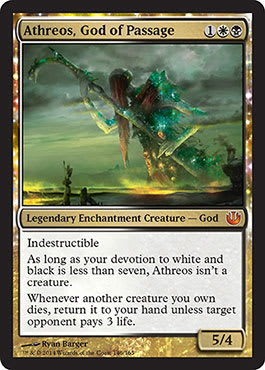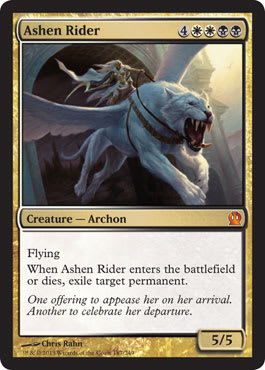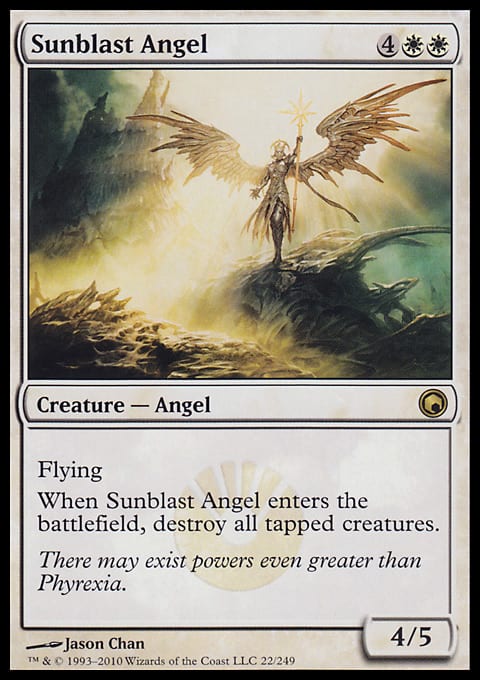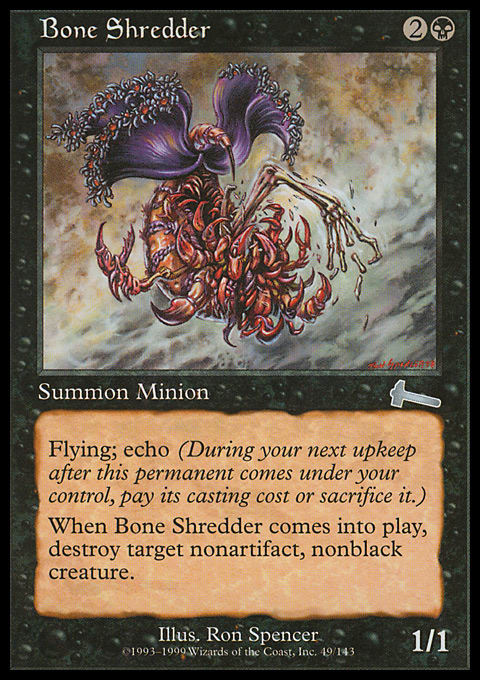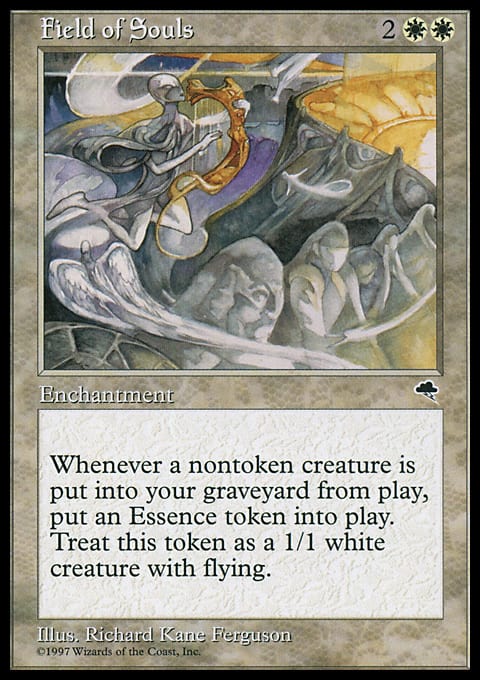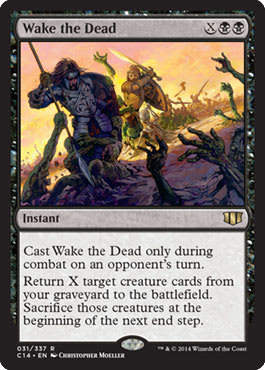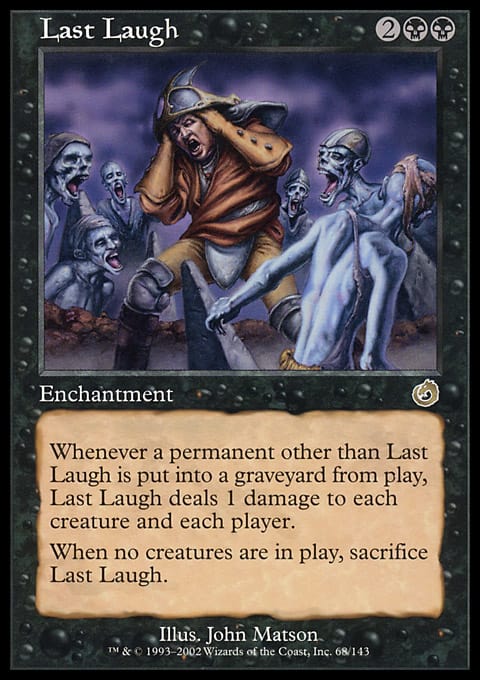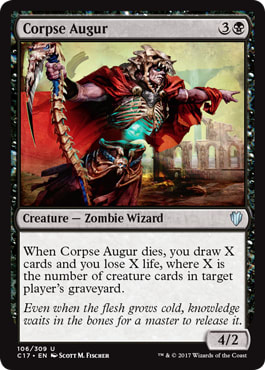There are a lot of ways we can be inspired to build a new deck; every once in a while we just see someone having so much fun with a card that we want to join the party. That’s what brought me to Athreos, God of Passage: the craziest deck-builder in Seoul, a guy named Aaron, wrecked us with funky recursion and life-loss shenanigans in an Athreos deck, and I ended up buying a copy of Athreos that night just so I could get in on the action.
I never play White, but sometimes I play Orzhov.
Orzhov Origins
My first Orzhov build was Teysa, Orzhov Scion, largely based around tokens and enchantments. If I got a copy of Mesa Enchantress out, I was golden; otherwise . . . not so much. Then when Vish Kal, Blood Arbiter came out, I took Teysa apart and built a new deck from scratch (as I wrote about here), and it went from rarely played to one of my favorite decks. Vish is a mid-range monster, with strong removal, recursion, and life-gain elements. Vish himself can also be very explosive, jumping from 5 power to twenty-one or more in a single turn. 1
Enter Athreos, and I wasn’t sure I could build something new around him, having already experimented with so many different Orzhov themes. Obviously Athreos demands dudes with Enter the Battlefield (ETB) abilities, but I use ETB dudes in most of my decks, so I was afraid he might get stale.
Then I found my hook.
Extort. Such a simple little mechanic, but so wonderfully synergistic with Athreos. Athreos wants you to play with lots of dudes, get your opponents to give them back to you when you die, and re-cast them multiple times. Extort is found mainly on small dudes that your opponents are unlikely to be scared of, it works every time you cast a spell, and it reduces your opponents’ life so that they are less likely to pay the ‘death tax’ for Athreos. Extort is clearly the peanut butter to Athreos’s chocolate.
Once I knew that I wanted to cram in as much extort as possible, the rest of the deck just clicked into place. Wall-to-wall utility dorks, aggro enablers and a handful of top-end threats to finish off my demoralized opponents in the late game.
Here is the decklist, which you can play-test here:
Athreos, All Day Pass ? Commander | Daryl Bockett
- Commander (1)
- 1 Athreos, God of Passage
- Creatures (39)
- 1 Angel of Despair
- 1 Archon of Justice
- 1 Ashen Rider
- 1 Ayli, Eternal Pilgrim
- 1 Bloodgift Demon
- 1 Corpse Augur
- 1 Deathbringer Liege
- 1 Deathbringer Regent
- 1 Divinity of Pride
- 1 Faceless Butcher
- 1 Fleshbag Marauder
- 1 Gonti, Lord of Luxury
- 1 Hallowed Spiritkeeper
- 1 Imposing Sovereign
- 1 Kami of Ancient Law
- 1 Kami of False Hope
- 1 Karlov of the Ghost Council
- 1 Karmic Guide
- 1 Kingpin's Pet
- 1 Kor Cartographer
- 1 Kor Sanctifiers
- 1 Leonin Relic-Warder
- 1 Liliana's Shade
- 1 Merciless Executioner
- 1 Pontiff of Blight
- 1 Puppeteer Clique
- 1 Shadowborn Demon
- 1 Sidisi, Undead Vizier
- 1 Slum Reaper
- 1 Stonehorn Dignitary
- 1 Sunblast Angel
- 1 Teysa, Orzhov Scion
- 1 Thrull Parasite
- 1 Treasury Thrull
- 1 Vizkopa Confessor
- 1 Voracious Hatchling
- 1 Vulturous Aven
- 1 War Priest of Thune
- 1 Windborn Muse
- Instants (5)
- 1 Dawn Charm
- 1 Intervention Pact
- 1 Return to Dust
- 1 Utter End
- 1 Wake the Dead
- Sorceries (3)
- 1 Immortal Servitude
- 1 Merciless Eviction
- 1 Vindicate
- Enchantments (10)
- 1 Authority of the Consuls
- 1 Black Market
- 1 Blind Obedience
- 1 Cathars' Crusade
- 1 Dictate of Erebos
- 1 Field of Souls
- 1 Ghostly Prison
- 1 Last Laugh
- 1 Underworld Connections
- 1 Worship
- Artifacts (4)
- 1 Armillary Sphere
- 1 Commander's Sphere
- 1 Orzhov Keyrune
- 1 Sword of the Animist
- Lands (38)
- 10 Plains
- 10 Swamp
- 1 Bojuka Bog
- 1 Caves of Koilos
- 1 Emeria, The Sky Ruin
- 1 Evolving Wilds
- 1 Exotic Orchard
- 1 Godless Shrine
- 1 Leechridden Swamp
- 1 Marsh Flats
- 1 Mistveil Plains
- 1 Mortuary Mire
- 1 Nykthos, Shrine to Nyx
- 1 Orzhov Basilica
- 1 Orzhova, the Church of Deals
- 1 Shambling Vent
- 1 Starlit Sanctum
- 1 Temple of Silence
- 1 Terramorphic Expanse
- 1 Windbrisk Heights
Execution
Playing Athreos is a unique challenge for the multiplayer strategist. Of course, anyone can try to negotiate the return of their creatures through the kind of political maneuvering I've talked about in the past. “Will you let me have my Ashen Rider back if I promise not to target your permanents?” or “I’ll let you choose the target for my death trigger if you let me get my creature back.” However, this is amateur hour: the challenge — and the fun — of Athreos is figuring out who has the most to gain and lose from every single creature in your deck. Remember, Athreos is a targeted effect; you get to choose which opponent will make the decision for each creature, so choose wisely!
When you chose an opponent with Athreos, you're asking them to make a decision based on how much life they have and how threatening that creature is, but that decision is going to be different for every player. If your deck doesn’t run many enchantments, you will probably let me recur a War Priest of Thune in order to deal with all of your other opponents’ enchantments (and if you’re really good at this game, you’ll realize that a War Priest makes me more of a threat to the enchantment players, which will encourage them to attack me rather than you). The same is true for Black players who aren't afraid of my innocent little Bone Shredder, or the token player who is happy to sacrifice their thopters in order to watch my Slum Reaper kill a bunch of angels and dragons.
Don’t believe me? Here are some cards that are easy to recur if you choose the right opponent:
| You can get this back . . . | . . . if you ask this guy |
|---|---|
| Archon of Justice | The player with the weakest permanents |
| Kami of False Hope | The player who is most afraid of an alpha strike |
| Sunblast Angel | The player without any tapped creatures |
| Thrull Parasite | The player without counters on their permanents, or who is worried about someone else’s planeswalkers |
| Vizkopa Confessor | The player who is Hellbent |
| Windborn Muse | The player with the most mana, or who has no creatures at the moment |
Remember that nobody at the table is really your friend, but nobody wants to spend three life unless they get value from it. Athreos is much more strategic than political, as long as you can figure out who benefits most (or suffers least) from the cards you recur.
Plan B
Or at least, that’s the theory. On the other hand, there are definitely some people who will not play my game for whatever reason. Some folks won’t let me have anything back because they either don’t like or don’t trust me. Some folks would rather deny me cards at the cost of their own life because of hidden information (maybe they have a powerful life-gain spell in hand that will undo the damage Athreos has inflicted). Others might just be mad that I’ve drained their life with extort too many times.
Let me give an example from a recent three-player game. I bore the brunt of an angelic assault from a Boros deck, and chump-blocked with my Sunblast Angel. The Boros deck had three tapped fliers, and the Gruul deck had no way to block them, and a mere 13 life. Of course I asked the Gruul player if I could have Sunblast Angel back, in order to eliminate the mutual threat. To my surprise, he said no, going down to ten life to bin my angel. He explained that it was important to deny resources to an Athreos deck, and he was right . . . after the Boros deck killed him, those fliers finished me off. I was top-decking like crazy for three turns and died because I couldn’t find just one more creature, because of all the life the Gruul player had paid to keep them away from me. It was a loss for me, but only a Pyrrhic victory for the Gruul player. Most importantly though, it was a loss for the basic concept of the deck: you can't always rely on your opponents to have the same view of their interests that you do.
There are two lessons that playing Athreos has reminded me of, and we should always remember that:
- Your opponents don’t always play rationally
- Your opponents’ decisions don’t always seem rational to you, even if they are
The danger of playing Athreos is that, if nobody allows you to recur your creatures then your whole came plan can fall apart in a hurry. That means you need to rely on more than just (your interpretation of) your opponents’ enlightened self-interest. The first way to do this is aggro; find someone who is so low on life that they can't afford to pay three life just to slow you down. If you can't find an opponent on low life, then make one; Athreos decks typically have a higher creature count and a lower mana curve than almost any other commander in the game, so you should be able to knock someone down to a low enough life total that they will serve your interests. I had a game recently where an Edric, Spymaster of Trest player was so busy ramping that he didn’t have any blockers until turn five. By that time Athreos had dropped him to 20 life, at which point I turned my attention elsewhere. For the rest of the game, Edric was very obliging about letting me have my creatures back, because he didn’t have much life to spare.
The second way is, of course, politics. Instead of just choosing an opponent who will benefit from you replaying a creature, you might have to persuade them that it is in their interest (what I call Low Politics) by explaining what you are most threatened by, and therefore how you’re likely to use it. You might even need to bargain with someone about how you will use the creatures you get back (High Politics). This might go in a couple of different directions. If you let me get my Bone Shredder back, you might want an assurance that I won’t use it against you. But because players can see what other cards go back to your hand with Athreos, they might be more worried about something else. You might have to make a deal along the lines of, “If you let me recur my Bone Shredder, I won’t destroy your enchantment with the Kor Sanctifiers that I got back last turn.”
Alternately, a player who is on low life might only let you have a creature back if you promise not to extort anything for a turn or two. This is worth looking at in more detail. The basic idea of an Athreos deck is that you can find a player who won’t be harmed by a card, so that they will let you have stuff back. But if you are extorting every spell, then they are still getting hurt, even if it’s just a single point of life. Imagine that you are a Black mage, and I’m asking you if I can recur my Bone Shredder when I have Blind Obedience in play. Will you be willing to pay three life to keep the Shredder from going back to my hand?
| Pros: | Cons: |
|---|---|
| Bone Shredder will kill an opponent’s creature | You will lose one life |
| That opponent might get mad at me, drawing attention away from you | I will gain life, making it harder for you to kill me |
| Each of your other opponents will lose one life, making it easier to kill them | I will have another creature available to attack with, block with, equip, etc. |
In this case, it would usually be the right play for you to let me have the Bone Shredder back. However, if I have three extort cards in play, then you would lose three life (and so would everyone else) while I would gain perhaps nine life. In this case, extort can work against Athreos, and you might have to agree not to use it in exchange for getting your creatures back.
Bonus: Secret Tech
Here are the five underplayed cards I’ve found that add the most to an Athreos build.
5: Field of Souls
This gives you a constant board presence, and especially helps you out against flying hordes. With a lot of cheap creatures going to the bin, Field produces a lot of tokens, and that allows you to punish anyone who pays life to keep your critters out of circulation.
4: Kami of False Hope
This is perfect for both the strategic and political sides of Athreos. Lots of people will want to keep a repeatable Fog effect on the table, and some of them might be willing to offer you cash and prizes if you use it when they're under attack.
3: Wake the Dead
This has quickly become one of my favorite Black spells, perhaps second only to Corpse Dance, but in Athreos it is insane. All of the creatures you bring back will be sacrificed at the end of turn . . . which triggers Athreos again! I’ve had some killer turns with Wake the Dead for five or more; the combat trick can really punish an opponent, reusing your ETB effects is great value, and the amount of life loss that Athreos can point at a single opponent (I always target the same opponent with all the triggers) means that you are almost certain to get a couple of those critters back in your hand.
2: Last Laugh
One of the most effective ways to turn mana into damage in the whole game. With a lot of little utility dudes, Athreos can ensure that Last Laugh has a big impact right away, and with an indestructible commander, you have a decent chance of keeping it on the table indefinitely.
1: Corpse Augur
This might look weak, but it is the engine that drives Athreos, ensuring that you always have enough cards in hand to keep the pressure on. When Augur dies, you usually draw a decent number of cards (and occasionally a ridiculous number!), and opponents seem more likely to let you have a creature back if you're using it to hurt yourself. Remember that Corpse Augur lets you target a player, meaning that you can maximize or minimize the number of cards you draw, depending on the situation. Plus it pumps up your Graveborn Muse!
1 That is why I took out Lightning Greaves and Swiftfoot Boots — too easy to just blow people out of games.
















